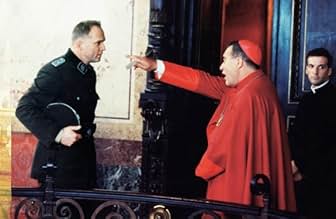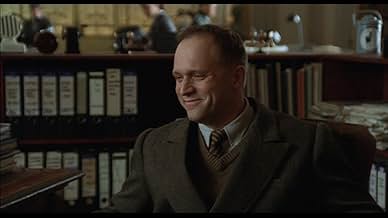अपनी भाषा में प्लॉट जोड़ेंDuring WWII SS officer Kurt Gerstein tries to inform Pope Pius XII about Jews being sent to extermination camps. Young Jesuit priest Riccardo Fontana helps him in the difficult mission to in... सभी पढ़ेंDuring WWII SS officer Kurt Gerstein tries to inform Pope Pius XII about Jews being sent to extermination camps. Young Jesuit priest Riccardo Fontana helps him in the difficult mission to inform the world.During WWII SS officer Kurt Gerstein tries to inform Pope Pius XII about Jews being sent to extermination camps. Young Jesuit priest Riccardo Fontana helps him in the difficult mission to inform the world.
- निर्देशक
- लेखक
- स्टार
- पुरस्कार
- 4 जीत और कुल 9 नामांकन
फ़ीचर्ड समीक्षाएं
This is noticeably a continental European film, with brilliant direction and dazzlingly good acting, more Gosford Park than Schindler's List in terms of pace. Indeed, this slow pace only highlights the frustration felt by the two main characters as they are continually beaten down by the well-meaning leaders of their Churches.
Frustration, interestingly, is the only lasting emotion inspired in the viewer. Dr Germaine Greer attributed this, wrongly, I believe, to the fact that the film "doesn't seem to go anywhere", highlighting the leitmotiv frame of a so-called 'goods' train on its way to an unseen destination as a representation of this lack of direction. I would venture to suggest, though, that a conclusion is precisely what the director, the justly renowned Costa Garvas, was trying to avoid - he does not straightjacket his characters plainly as either heroes or villains and the film closes with the issues of morality it has raised left open-ended. It is meant to be thought provoking, not moving; the viewer is meant to conclude for himself what was morally correct and what was not.
At the end of the film, I found myself wondering which of the characters was most right - for none, it would seem, have a sole handle on the moral high-ground and there are arguments that promote each character's actions over another's. Whatever way you see this film and whatever conclusion you draw, it is a production which will not let you sleep easy until you have been challenged on many issues of morality.
Another perfect performance is given by the priest who tries to help the German officer. Mathieu Kassovitz (who also played the male leading role in 'Le Fabuleux destin d'Amélie Poulain')is very convincing in his role.
I think this movie is highly underrated. Costa-Gavras has made an important movie with 'Amen.' which looks at the holocaust-tragedy from another point of view which is seldom showed. The movie gives a true although unbelievable answer at one of the most important questions concerning the holocaust: didn't anyone saw this coming? Couldn't anyone prevent this from happening?
If you really want to know the answers to this questions, you certainly have to watch 'Amen.'. This movie should at least have an 8 and I'll give you two reasons why: one because the story is unique and magnificently told; and two because the two leading actors are giving the performance of a lifetime. Highly recommendable!
9/10
"Amen" begins with the Nazi euthanasia program aimed at murdering retarded and mentally ill Germans. A campaign, spearheaded by both Protestant and Catholic clerics and their flocks, forced the regime to end the killings. Some have argued that this sole widespread public rejection of Nazi homicidal machinations might well have been repeated if Germans were alerted - internally or through specific denunciations by the pope and foreign leaders - of the fate of deported Jews and those rounded up in conquered territories. "Amen's" Kurt Gerstein and his priest friend both believe that would have happened.
That argument is at best questionable and, more likely, reflects the human need for the wish to spawn the thought. Whether one accepts the Goldenhagen thesis of mass complicity by Germans in the Holocaust, the fact remains that when the slaughter began Germany was at war and, as a character in "Amen" notes, defending the Reich and winning the war, to say nothing of staying clear of what would be seen as treasonous ideas, was the only realistic option.
Kurt Gerstein is a mystery. As Hannah Arendt wrote of Eichmann as an example of evil's often banal incarnation, historian Saul Friedlander described Gerstein years ago in terms of the ambiguity of good. Gerstein sincerely and at risk to his life tried to warn the Vatican of the Nazi death camps. But he also worked efficiently to make those camps operationally efficient. "Amen's" Gerstein is tortured but also highly compartmentalized. He gives quick and accurate advice to improve destruction of the "units," as the Jews were referred to, and then tries to prevent use of the Zyklon B gas he helped develop with almost unbelievable declarations that shipments are defective and must be buried.
This film owes its origin not so much to Friedlander's compelling account but to Rolf Hochhuth's controversial (still so after many years) "The Deputy," presented as a play to the outrage of many. Hochhuth portrayed Pope Pius XII as insensitive and unwilling to use his moral authority to challenge an extermination program he knew to be in progress.
In the film Gerstein is aided by a young Jesuit priest whose remarkable moral and physical courage was demonstrated by a few, or perhaps too few, clerics who knew what was happening. The pope is shown as a remote, unemotional figure. The now standard explanations for the Vatican's unwillingness to take on the Nazis are included in catalogue format. Allied unwillingness to bomb the death camps or take in refugee Jews are recited almost for the record. Complex questions still debated are reduced to the equivalent of sound bites. They need no repeating here.
Hochhuth's thesis which outraged many decades ago and which still brings angry denunciations has been partially rehabilitated by scholarly works such as John Cornwell's provocatively titled study, "Hitler's Pope," an exaggeration which belies the serious research and analysis within the book's covers.
Cornwell's pope is personally unpleasant, haughtily autocratic, rabidly fearful of Communism, at least mildly anti-Semitic and certainly emotionally and politically pro-German if not pro-Hitler (he wasn't that). The Pope Pius of "Amen" lacks the depth a more accurate and compelling portrayal would have provided.
The strongest moments in the film are those briefly showing the efficiency of the death camps focusing less on the victims, most of whom aren't shown, but rather on the chillingly competent technicians and logisticians without whose efforts millions could not have been murdered.
Director Costa-Gravas deserves much credit for bringing a difficult to tell complex story to the screen. Ultimately, however, we know less about Kurt Gerstein than we need to and the Vatican, from pope to bureaucrat, is too colorless. Was Gerstein a victim or a collaborator with a schizophrenic sense of morality? Even scholar Friedlander couldn't answer that question. Did the Vicar of Christ shame his church's vision of Jesus by putting political expediency ahead of moral imperative? That is a very alive issue today but "Amen" gives us a largely one-dimensional Supreme Pontiff.
The cast is unknown to American viewers but all act with varying but generally strong ability. Gerstein and the Jesuit priest are especially well portrayed as men of deep conviction.
7/10
I do not have the knowledge of history to know whether this story is accurate or manipulative, but as a movie it is powerful and striking. Costa-Gavras directs this film about Holocaust based on the history of the German Kurt Gerstein, who unsuccessfully tried to tell the world about the mass murderers in the concentration camps. The performance of Ulrich Tukur is magnificent, giving total credibility to his character. With regard to the role of the Catholic Church, I believe the exposition is simplistic and does not show the big picture of the political environment that the Vatican was living in that historical moment, focusing only in the attempt of the SS officer in having an audience with the Pope. My vote is eight.
Title (Brazil): "Amém." ("Amen.")
क्या आपको पता है
- ट्रिवियाStefan Lux was a Jewish Czech journalist, who committed suicide in the general assembly room of the League of Nations during its session on July 3, 1936, to alert the world on the perils of German anti-Semitism. After shouting "C'est le dernier coup" ("This is the final blow") he shot himself with a revolver.
- गूफ़In one of the scenes they say that the Treblinka camp is out of gas, referring to Zyklon B. Treblinka didn't use Zyklon B, instead they used carbon monoxide.
- भाव
[first lines]
Stephan Lux: [interrupting a session of the Assembly of the League of Nations, Geneve, 1936] My name is Stephan Lux. I am Jewish. The Jews are being persecuted in Germany and the world doesn't care.
[He draws a pistol]
Stephan Lux: I see no other way to reach people's hearts.
[He shoots himself]
- कनेक्शनReferenced in Kaamelott: Amen (2005)
- साउंडट्रैकThe Train I /II
Composed and arranged by Armand Amar
Orchestra:
Jean-Philippe Audin, Elsa Benabdallah, Igor Boranian, Fabien Boudot, Florent Bremond, Karen Brunon, Nathalie Carlucci, Hervé Cavellier, Emmanuel Gaugué, Thierry Köhl, Julien Leenhardt, Bobin Minalli Bella, Marthe Moinet, Yves Monciero, Philippe Morel, Amèlie Paradis, Emmanuel Raynaud, Alexandre Sauvaire
(P) & © 2002 Long Distance/France
टॉप पसंद
- How long is Amen.?Alexa द्वारा संचालित
विवरण
- रिलीज़ की तारीख़
- कंट्री ऑफ़ ओरिजिन
- आधिकारिक साइटें
- भाषाएं
- इस रूप में भी जाना जाता है
- Âmin
- फ़िल्माने की जगहें
- उत्पादन कंपनियां
- IMDbPro पर और कंपनी क्रेडिट देखें
बॉक्स ऑफ़िस
- बजट
- FRF 10,30,00,000(अनुमानित)
- US और कनाडा में सकल
- $2,74,299
- US और कनाडा में पहले सप्ताह में कुल कमाई
- $16,284
- 26 जन॰ 2003
- दुनिया भर में सकल
- $84,19,052
- चलने की अवधि2 घंटे 12 मिनट
- रंग
- ध्वनि मिश्रण
- पक्ष अनुपात
- 1.85 : 1
इस पेज में योगदान दें


































